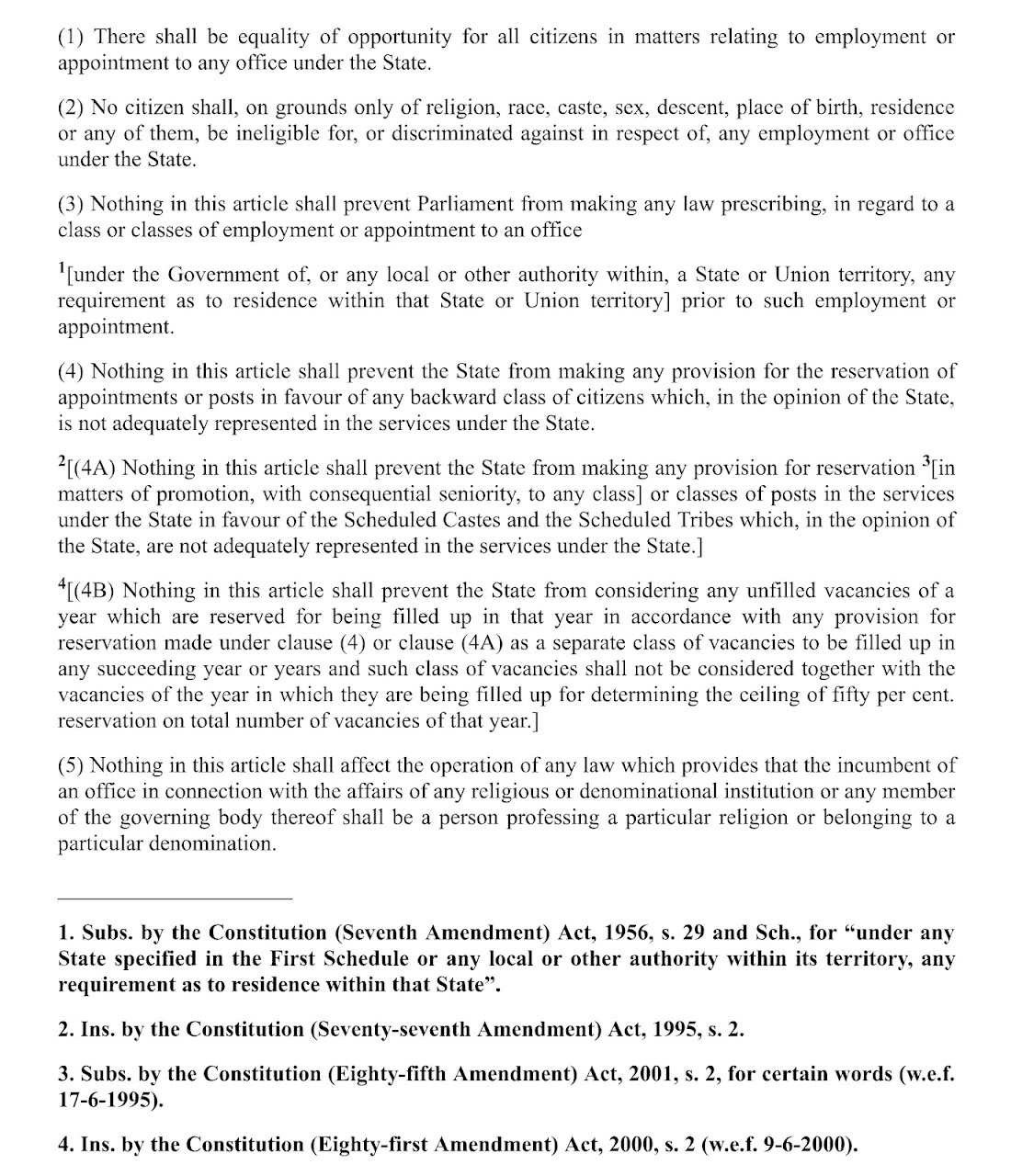Right to Equality under Constitution of
India
Article 14, Article 15, Article 16,
Article 17, Article 18
Brief
|
Article |
Brief description |
|
Article 14 |
The
State shall not deny to any person equality before the law or the equal
protection of the laws within the territory of India, on grounds of
religion, race, caste, sex or place of birth |
|
Article 15 |
The
State shall not discriminate against any citizen
on grounds only of religion, race, caste, sex, place of birth or any of them. |
|
Article 16 |
There
shall be equality of opportunity for all citizens
in matters relating to employment or appointment
to any office under the State. |
|
Article 17 |
Abolition
of untouchability |
|
Article 18 |
Abolition
of all titles except military and academic |
Original:
14. Equality
before law: The State shall not deny to any person
equality before the law or the equal protection of the laws within the
territory of India Prohibition of discrimination on grounds of religion, race,
caste, sex or place of birth
15. Prohibition
of discrimination on grounds of religion, race, caste, sex or place of birth
(1) The
State shall not discriminate against any citizen on grounds only of religion,
race, caste, sex, place of birth or any of them
(2) No
citizen shall, on grounds only of religion, race, caste, sex, place of birth or
any of them, be subject to any disability, liability, restriction or condition
with regard to
(a) access
to shops, public restaurants, hotels and palaces of public entertainment; or
(b) the
use of wells, tanks, bathing ghats, roads and places of public resort
maintained wholly or partly out of State funds or dedicated to the use of the
general public
(3) Nothing
in this article shall prevent the State from making any special provision for
women and children
(4) Nothing
in this article or in clause ( 2 ) of Article 29 shall prevent the State from
making any special provision for the advancement of any socially and
educationally backward classes of citizens or for the Scheduled Castes and the
Scheduled Tribes
16. Equality
of opportunity in matters of public employment
17. Abolition
of Untouchability: Untouchability is abolished
and its practice in any form is forbidden The enforcement of any disability
arising out of Untouchability shall be an offence punishable in accordance with
law
18. Abolition
of titles: No title, not being a military or
academic distinction, shall be conferred by the State. No citizen of India
shall accept any title from any foreign State. No person who is not a citizen
of India shall, while he holds any office of profit or trust under the State,
accept without the consent of the President any title from any foreign State.
No person holding any office of profit or trust under the State shall, without
the consent of the President, accept any present, emolument, or office of any
kind from or under any foreign State Right to Freedom.
Describe :
Equality before the law (Article 14)
Article
14 treats all people the same in the eyes of the law.
- This provision
states that all citizens will be treated equally before the law.
- The law of the
country protects everybody equally.
- Under the same
circumstances, the law will treat people in the same manner.
Prohibition of discrimination (Article 15)
This article
prohibits discrimination in any manner.
- No citizen
shall, on grounds only of race, religion, caste, place of birth, sex or
any of them, be subject to any liability, disability, restriction or
condition with respect to:
- Access to public places
- Use of tanks, wells, ghats, etc. that are
maintained by the State or that are meant for the general public
- The article also
mentions that special provision can be made for women, children and the
backward classes notwithstanding this article.
Equality of opportunity in matters of public
employment (Article 16)
Article
16 provides equal employment opportunities in State service for all citizens.
- No citizen shall
be discriminated against in matters of public employment or appointment on
the grounds of race, religion, caste, sex, place of birth, descent or
residence.
- Exceptions to
this can be made for providing special provisions for the backward classes.
Abolition of untouchability (Article 17)
Article
17 prohibits the practice of untouchability.
- Untouchability
is abolished in all forms.
- Any disability
arising out of untouchability is made an offence.
Abolition of titles (Article 18)
Article
18 abolishes titles.
- The State shall
not confer any titles except
those which are academic or military titles.
- The article also
prohibits citizens of India from accepting any titles from a foreign State.
- The article
abolishes the titles that were awarded by the British Empire such as Rai Bahadur,
Khan Bahadur, etc.
- Awards
like Padma Shri, Padma Bhushan, Padma Vibhushan, Bharat Ratna and military
honours like Ashok Chakra, Param Vir Chakra do not belong to this category.
 /* Variable definitions
====================
/* Variable definitions
====================

No comments:
Post a Comment